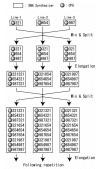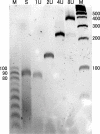Multi-line split DNA synthesis: a novel combinatorial method to make high quality peptide libraries
- PMID: 15341664
- PMCID: PMC520752
- DOI: 10.1186/1472-6750-4-19
Multi-line split DNA synthesis: a novel combinatorial method to make high quality peptide libraries
Abstract
Background: We developed a method to make a various high quality random peptide libraries for evolutionary protein engineering based on a combinatorial DNA synthesis.
Results: A split synthesis in codon units was performed with mixtures of bases optimally designed by using a Genetic Algorithm program. It required only standard DNA synthetic reagents and standard DNA synthesizers in three lines. This multi-line split DNA synthesis (MLSDS) is simply realized by adding a mix-and-split process to normal DNA synthesis protocol. Superiority of MLSDS method over other methods was shown. We demonstrated the synthesis of oligonucleotide libraries with 1016 diversity, and the construction of a library with random sequence coding 120 amino acids containing few stop codons.
Conclusions: Owing to the flexibility of the MLSDS method, it will be able to design various "rational" libraries by using bioinformatics databases.
Figures



References
-
- Smith GP. Filamentous fusion phage: novel expression vectors that display cloned antigens on the virion surface. Science. 1985;228:1315–1317. - PubMed
Publication types
MeSH terms
Substances
LinkOut - more resources
Full Text Sources
Other Literature Sources

